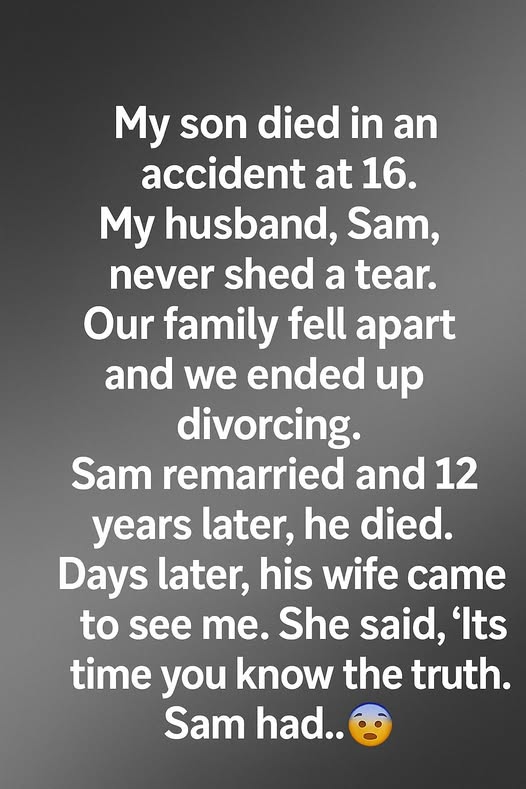My son died in an accident when he was sixteen. One moment he was here, laughing as he ran out the door, and the next he was gone. Through it all—the still hospital alarms, the funeral crushing me from the inside, the empty house echoing with memories—my husband, Sam, never shed a single tear.
Not one.
While I fell apart, he became stone. At the hospital, he stood rigid, jaw locked, as if grief were something he could muscle through. At the funeral, I leaned against the coffin, barely able to breathe, and he stood beside me like a man carved from granite. At home, when the silence became unbearable, he cleaned the garage, fixed things that didn’t need fixing, worked late, slept little, spoke even less.
I was drowning. He kept walking.
I begged him to talk, to feel, to let me in. He would just look at me with eyes so tired they barely resembled the man I married.
“I have to stay strong,” he’d say. That was it. Always that.
But strength without softness becomes distance. Over time, that distance hardened. Our grief pushed us apart. I wanted to be heard. He wanted to disappear. We didn’t understand each other, and eventually, we stopped trying. The resentment built quietly, then all at once, cracking our marriage in ways we never recovered from.
We divorced. Not explosively. Not dramatically. Just quietly—like two people with nothing left to hold onto except sorrow they couldn’t share.
He remarried a few years later, and I told myself I didn’t care. Life moved forward, scattering us like leaves in the wind.
Twelve years passed. Our son would have been twenty-eight.
One morning, I got a phone call. Sam was gone. Sudden. Unexpected. No chance for one more conversation. No chance to make peace. No chance to ask why he never let me in. Even after everything, the news hit me hard. Not the sharp pain of losing a spouse, but the ache of losing the last link to the child we once shared.
A few days after the funeral, his new wife called. She said she needed to talk. Her voice trembled, twisting my stomach into knots.
When she arrived, she sat at my kitchen table, gripping a cup of tea she never touched. For a long moment, she didn’t speak. Then she took a shaky breath.
“There’s something you deserve to know,” she said.
I braced myself.
She told me that Sam had cried. He just never cried in front of anyone—not me, not her, not friends, not family. The night our son died, after leaving the hospital, he drove to the small lake he used to visit with our boy. It was their place—a pocket of quiet where they fished, skipped stones, talked about school, shared jokes, where Sam pretended he wasn’t as proud as he really was.
That night, he sat in the dark and broke apart.
And he kept going back. Not for a week. Not for a month. For years. Every night at first. Then a few times a week. Then on birthdays, holidays, anniversaries. He brought flowers. He talked to our son. He cried until he had no tears left, then cried again.
He hid it all because he didn’t want me to see him fall apart. He thought that if he stayed strong, I’d have something to lean on.
When she finished, she wiped her face and said softly, “He never stopped loving you. And he never stopped loving your son. His grief didn’t look like yours, but it was there—every single day.”
I couldn’t speak. I couldn’t breathe. All those years, I had believed he felt nothing. That he had abandoned the pain. That he had abandoned me. The truth was the opposite. He had grieved in secret, carrying a weight he didn’t know how to share.
After she left, I felt a pull toward the lake. Not logic, not memory—instinct, quiet but insistent. I drove there as the sun began to sink, the water glowing orange and gold, the air still.
Near the shoreline, under the tree our son used to climb, I noticed a small wooden box wedged in a hollow of the trunk, worn by weather and time.
I opened it with trembling hands.
Inside were letters. Dozens of them. Some crisp, some soft with age, many stained with tears. Each envelope had our son’s name in Sam’s familiar handwriting.
One letter for every birthday since the accident. One for every milestone our son never reached. Stories. Apologies. Memories I had forgotten. Regrets he never said out loud. And love—more love than I had known he carried.
I sat in the cold grass, reading until the last light faded. It felt as though Sam was speaking to me through time, grief, and the silence that had once split us.
Only then did I see it clearly.
Grief isn’t a single language. Not all pain screams. Not all sorrow weeps in public. Some hearts break openly, and others quietly behind closed doors. Some people shatter loudly. Others crumble silently, hoping no one sees them fall.
Both are still grief.
Both are still love.
The version of Sam I carried in my anger wasn’t the real one. He didn’t abandon our son. He didn’t abandon me. He grieved in a way I didn’t recognize—alone, hidden, believing it protected me.
As I sat by the lake, reading his letters, I whispered into the wind, “I see it now. I see you now.”
And for the first time since our son died, forgiveness settled into a place inside me that had been empty far too long.
